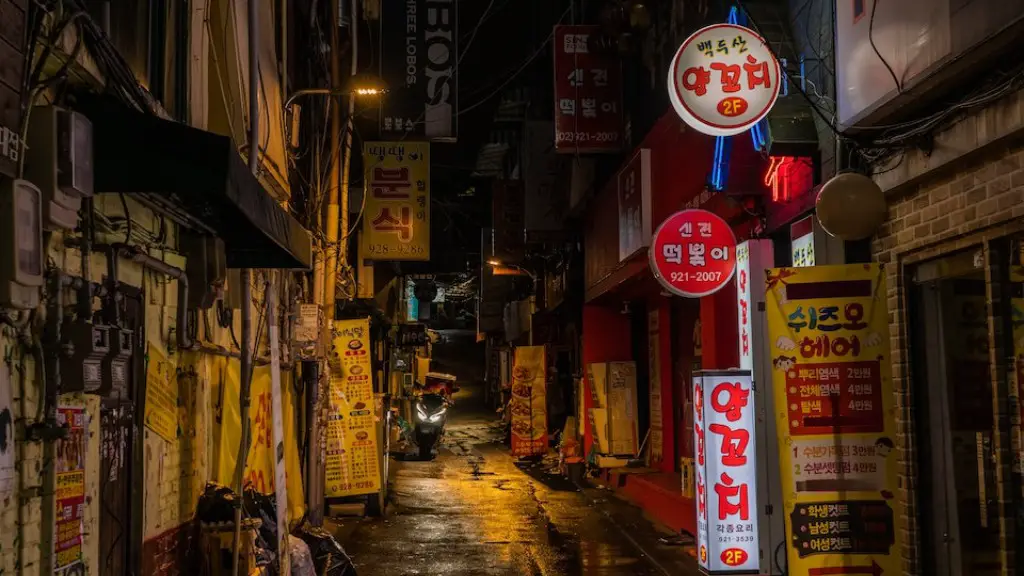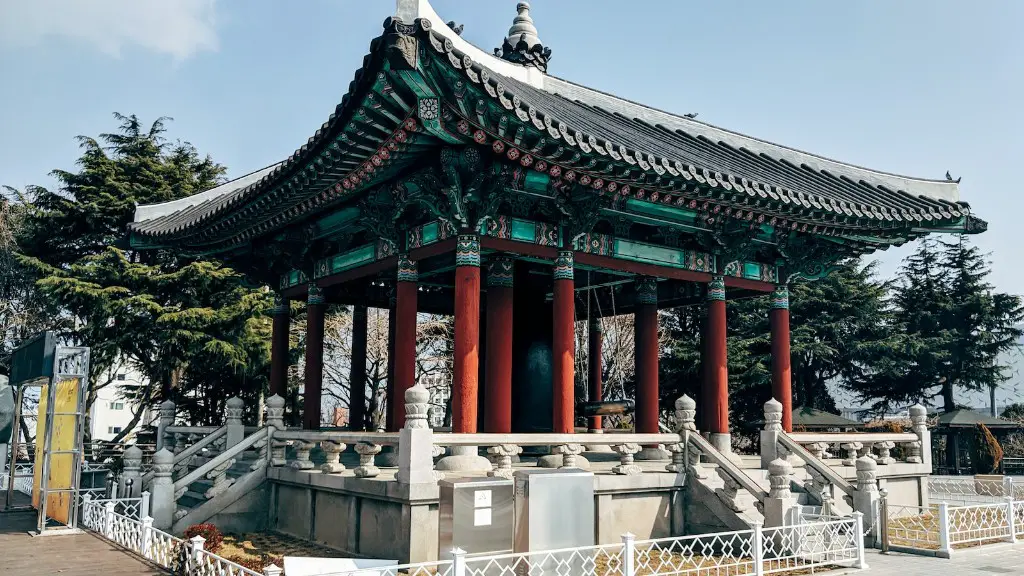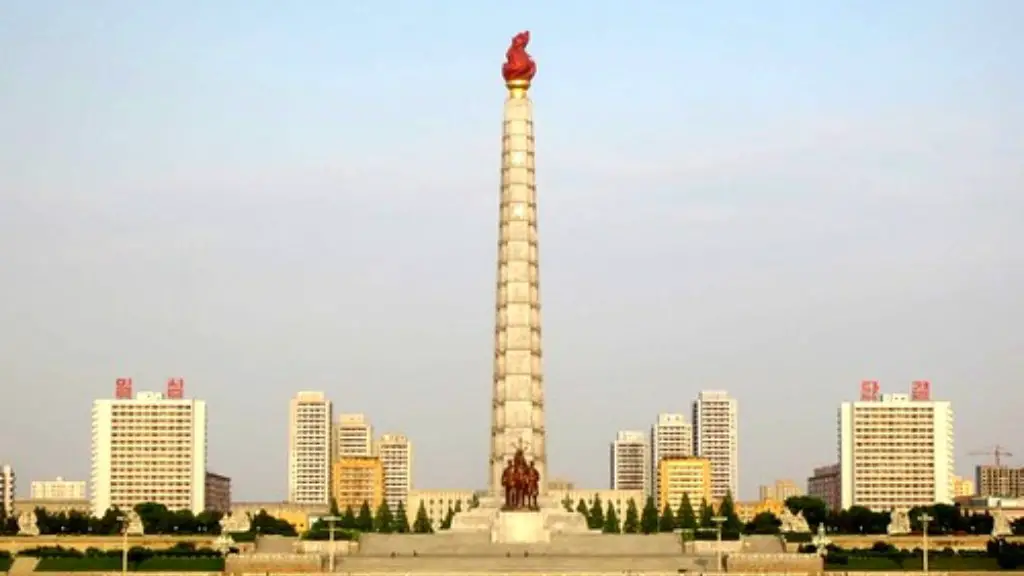Political System
North Korea is an isolated and secretive state, and is widely regarded as a dictatorship. It is officially known as the Democratic People’s Republic of Korea (DPRK), and is led by the ruling Korean Workers’ Party. North Korea is under the absolute control of the leader, Kim Jong-un, and his regime. The Supreme Leader holds all the power and wields it with impunity. This top-down control has made North Korea one of the most restrictive and oppressive countries in the world.
North Korea practices an extreme form of totalitarianism, characterized by one-man rule, strict censorship, a lack of civil liberties, and an intrusive security apparatus. All information within the country is strictly controlled by the regime and released only through the ruling party’s propaganda machinery. In addition, the regime discourages economic participation and foreign investment. This has resulted in a stagnant economy and a severe lack of basic necessities for many of its citizens.
Human Rights
North Korea has one of the worst human rights records in the world. The United Nations Commission of Inquiry on Human Rights in North Korea found that the regime has committed widespread and systematic human rights violations, with actions that amount to crimes against humanity. These include deliberate starvation policies, torture, arbitrary arrests, arbitrary killings, forced labor, and widespread violations of political, social, and economic rights.
The government has also been accused of enforced disappearances, arbitrary detention, and torture in its prison camps, where an estimated 120,000 people are held without due process or access to lawyers or family members. Furthermore, it has been reported that the North Korean military has used chemical weapons on its citizens, including nerve agents, mustard gas, and sarin gas.
Censorship
The regime also maintains tight control over the flow of information within the country, by censoring news and information, and restricting access to outside media sources. The government has even attempted to block access to the internet, as well as mobile phones, to keep its citizens from having access to outside information or expressing their opinions. It has also been noted that there are reports of government agents posing as ordinary citizens, in order to monitor conversations and shape public opinion.
It is also estimated that North Korea has an estimated ‘0.0005’% of internet usage, as the country has virtually no access to the World Wide Web, and only certain high-ranking officials and military personnel are allowed to access the country’s limited intranet.
Economy
North Korea’s economy is largely centrally planned and relies heavily on the state’s control of raw material prices. The government has implemented a series of economic reforms over the years, in an attempt to stimulate the economy. While these reforms have had some positive effects, such as increased access to food, jobs, and basic necessities, the country still suffers from severe economic hardship and poverty.
The lack of foreign investment and an inefficient public sector have resulted in a lack of economic growth. North Korea’s GDP per capita is estimated to be around $1,800, which is less than what some sub-Saharan African countries have achieved. In addition, the country struggles with a persistent drought, with the United Nations estimating that the agriculture sector has increased in production by 33% since 2012.
International Relations
North Korea’s relations with the international community have become increasingly strained in recent years, as the regime continues to expand its nuclear weapons program and rejects calls to end its missile testing program. The Unites States and its allies have responded by engaging in economic and diplomatic sanctions against the government.
The international community has also been critical of North Korea’s treatment of its citizens, and has sought to increase human rights protections, but has been largely unsuccessful in this effort. North Korea has shown little interest in cooperating. The country has also remained an isolated state and has made very few attempts to open its borders to people or goods from other countries.
Political Stability
Given its repressive government and isolation from the international community, many observers have questioned how secure North Korea’s regime actually is. Despite the country’s oppressive nature and strained relations, the regime has proven to be surprisingly resilient. In recent years, it has remained relatively stable and positioned itself as a nuclear power, with few signs of any widespread uprisings or internal dissent.
North Korea is, however, still considered to be one of the most dangerous and unstable countries in the world. This is due to its belligerent rhetoric, nuclear ambitions, refusal to engage in meaningful dialogue and its lack of transparency when it comes to its internal affairs.
International Aid and Relief
Due to its dire economic circumstances, North Korea relies heavily on international aid and relief. The government is extremely hesitant to accept foreign aid, but the United Nations and other international organizations have been able to secure limited access to the country and provide humanitarian assistance to its citizens.
In addition, a number of countries provide diplomatic support and economic aid to North Korea. China has shown particular interest in providing economic assistance, as well as engaging in discussions with the North Korean government about its nuclear weapons program.
North Korea’s Future
North Korea’s future remains uncertain. Despite its resilient government, the country still faces severe economic hardship, a lack of civil liberties, and the threat of its nuclear weapons program. The international community has continued to pressure North Korea to end its nuclear program and open its borders, but the future of North Korea remains largely unknown.
International Sanctions
In an effort to curb the North Korean government’s nuclear ambitions and its human rights abuses, the United Nations and other international bodies have imposed sanctions against the country. These sanctions have been aimed at isolating North Korea economically, and have had a significant impact on its economy. The restrictions have been aimed at limiting trade and its ability to export goods, as well as limiting its access to financial services and foreign investments.
In addition, the United Nations has imposed travel bans on a number of senior North Korean officials, in an effort to pressure the government to change its policies. Despite the sanctions, North Korea has continued to make progress on its nuclear program and has shown little interest in engaging in meaningful dialogue with the international community.
Public Reactions
Public opinion on North Korea has been largely negative, due to its oppressive government and its nuclear ambitions. The country’s persistent refusal to engage in a meaningful dialogue with the international community and its continued provocations have resulted in widespread condemnation. While North Korea has made some efforts to open its doors to foreign investment and countries have opened diplomatic relations, there is still a widespread sense of distrust and hostility towards the state.
Public opinion in North Korea itself is difficult to measure, due to the government’s strict censorship and control of information. However, reports from defectors and foreign visitors have revealed that the population is largely resigned to their circumstances and that many people are simply struggling to survive.


